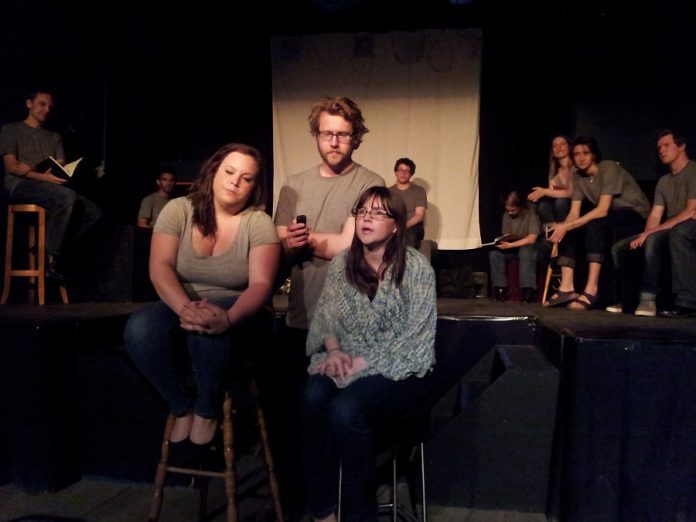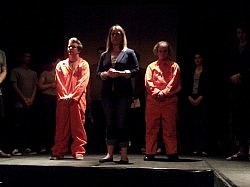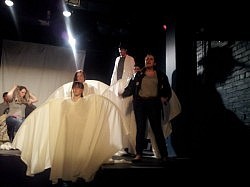
On October 6th, 1998, 21-year-old University of Wyoming student Matthew Shepard was viciously beaten, crucified on a fence post, and left for dead just outside of the town of Laramie, Wyoming. The reason for the beating? Matthew Shepard was gay.
The story made international headlines, and when Matthew died of his injuries on October 12th, his story opened up a dialogue about hate crimes and prejudice.
The Motley Collective is bringing Matthew Shepard’s story — a complex story with many opposing views and emotions — to The Gordon Best Theatre in their ambitious and daring production of The Laramie Project. Written by Moisés Kaufman and members of the Tectonic Theatre Project, The Laramie Project is a bold production with an interesting history.
Not long after the death of Matthew Shepard and the trial of his attackers, Aaron McKinney and Russell Henderson, Kaufman and a team travelled to Laramie to conduct interviews with the people who were affected first hand by the outcome of Shepard’s death. Kaufman’s group spoke to hundreds of people, including associates of Matthew and of his attackers, as well as religious leaders, law enforcement, neighbours, eye witnesses and relations.
Compiling these interviews together, the result was a massive stage show featuring 70 characters that reflects the social, political and religious climate of Laramie, Wyoming while recreating the story of Matthew Shepard’s murder — and how it helped shape and define the community that was overcome by a senseless and brutal murder.

It’s not just Matthew Shepard’s story, but the story of the people who were left to witness the fall-out. The result is a very unique — and potentially tedious — experience.
However, director Amy Cummings manages to do the impossible by assembling an incredible company of actors that’s able to bring together all of the characters with their own personal identities, conflicting opinions, and a full range of different emotions.
The talented 14-member cast — Meg O’Sullivan, Jen Walsh, Andrew Little, Elizabeth Moody, Kalene Lupton, Sarah McDonald, Piper Deck, Taylor Beatty, Tedd Bayne, Jim Mills, Gabriel Hudson, Tobias Bernstein, Jean-François Tremblay, and Drew Mills — is a combination of familiar faces and newcomers to the Peterborough stage, creating an interesting juxtaposition of performers.
Each actor takes on multiple roles, ranging from three to eight different characters throughout the performance. Meanwhile, they do this while almost always on what is a minimalist set, using small props and simple costume changes to help the audience decipher the changes in their characters.
At first, the audience depends heavily on the narration of Jean-François Tremblay, who acts as the show’s narrator.
However, as the story builds, the props and articles of clothing almost work as trigger objects that, combined with the actors change in voice and body language, help the audience keep each of the 70 characters straight — even as the monologues start coming at the audience in rapid fire.
When you have a large cast that’s responsible for bringing so many characters to life, it’s natural that some of the performances are stronger than others. Each actor gives a standout performance with at least one or two of the characters, while other less prominent characters slip under the radar. Although each performer brings something unique to the production and has a stand-out moment in the spotlight, certain performances create an emotional connection with the audience.

Some of the most powerful moments come into play when the audience is confronted with the face of evil. Andrew Little brings Reverend Fred Phelps, the controversial leader of the Westboro Baptist Church, to life in an explosive scene. Taylor Beatty re-enacts the chilling interrogation of Aaron McKinney in one of the shows more disturbing sequences.
The Laramie Project could have been a confusing mess at the hands of a less experienced company, but The Motley Collective — with its talented director and disciplined cast — manages to pull it off. The company brings the story to life through words and character instead of action, guiding the audience through an amazing and emotional journey.
All photos by Sam Tweedle.


























